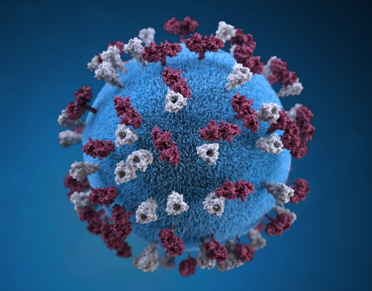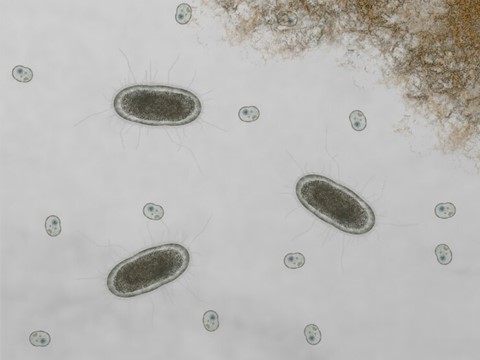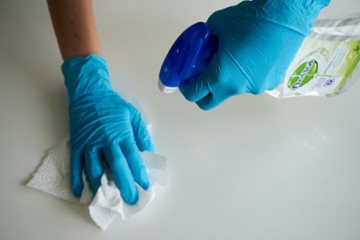Germs All That you Need to Know
Germs: All That You Need to Know!
A vast and mysterious world of microorganisms’ dwells in the invisible realm. These unseen organisms may appear small, but they have a tremendous impact on human health and well-being.
Understanding Germs: Unmasking the World of Germs
Germs, often known as microorganisms, can only be seen under a microscope. These microorganisms can be found in the air, water, and soil. They can take the shape of viruses, fungus, bacteria, protozoa, or helminths. While not all germs are detrimental to us, some bacteria that reside in and on our bodies are beneficial to our health, whereas others can cause illnesses and infections. As a result, understanding their behaviours is critical in limiting their negative consequences on our health.
Types of Germs: A Diverse Microcosm
Germs are tiny entities also knowns as microorganisms or microbes that are discovered almost Understanding germs is crucial for employing hygiene practices against harmful germs. These microbes are broadly divided into five types: Bacteria, Viruses, Fungi, Protozoans, and Helminths.
Bacteria:
Bacteria are the most abundant and diverse life forms on Earth, consisting of single-celled microbes. They are microscopic and can only be seen using a microscope. Bacteria can be found in the human body as well as in the air, soil, and water. hazardous, such as Lactobacillus acidophilus, which lives in our intestines and aids in digestion and nutrition cycling. Hazardous bacteria such as those that cause strep throat, tuberculosis, and urinary tract infections. They create poisons that harm our cells and tissues, causing us to get ill.

Viruses:
Viruses are distinct biological entities, smaller than bacteria, that contain genetic material. Viruses, unlike bacteria, cannot perform cellular tasks on their own. To replicate and produce new virus particles, they must infect a host cell and hijack its biological machinery.

Some diseases in humans, animals, and plants are caused by viruses. Viruses can cause illnesses ranging from the typical cold or flu to severe infections such as AIDS, Ebola, genital herpes, chickenpox, and COVID-19.
Fungi:
Fungi are a diverse collection of creatures that can be single-celled (yeasts) or multicellular (moulds and mushrooms). Few fungi are edible by humans, such as mushrooms, and yeast, another form of fungus, is a required ingredient in most types of bread. Candida, a yeast fungus, can cause thrush, an infection of the mouth and throat. Fungi also cause skin illnesses such as athlete’s foot, ringworm, and fungal pneumonia.

Protozoans:
Protozoans are eukaryotic single-celled organisms that belong to the kingdom Protista. Many protozoans dwell in our bodies; some are innocuous, while others can make you sick and cause illnesses such as Giardiasis, Malaria, Toxoplasmosis, and others.

Apart from human bodies, protozoans can be found in food, soil, fresh water, insects, and the oceans. As a result, it enters our bodies through the food and drink we ingest, and insects such as mosquitos spread malaria sickness.
Helminths:
The term "helminth" is derived from the Greek word for "worm." Helminths are multicellular, worm-like parasites that are classified into three groups: nematodes (roundworms), trematodes (flukes), and cestodes (tapeworms). They have complex life cycles and frequently require many hosts to mature.

If these parasites penetrate the human body, they settle in the digestive tract, lungs, liver, skin, or brain, causing helminthiasis disorders such as gastrointestinal difficulties, anaemia, and poor growth and development. These illnesses are widespread throughout the world, particularly in communities with inadequate sanitation and limited access to clean water.
Facts and Myths Related to Germs: Unravelling the Misconceptions
Cleaning and disinfection are synonymous:
This is not correct; cleaning refers to eliminating dirt and dust from surfaces rather than eradicating germs. Disinfecting surfaces implies destroying germs by dousing them with chemicals or solutions.
All germs are harmful:
In reality, trillions of bacteria exist in our bodies, many of which are helpful bacteria that aid digestion and support our immune systems.
The 5-second rule is safe:
People wonder if it's okay to eat food shortly after dropping it on the ground. It is dependent on what you dropped and where you dropped it. Dropping food on the floor and then picking it up is a bad idea since bacterial infection can start at the surface. Therefore, it’s advisable to discard the food and follow up with a thorough cleaning of the floor.
You can entirely eradicate all germs from your environment:
Germs are everywhere and impossible to eradicate completely. However, if you continue to take care and adhere to good hygiene practises, you can limit the likelihood of it spreading and infecting you.
You should bleach your laundry to kill all germs on it:
Bleaching could harm or spoil all your clothes. So, simply wash them with hot water and soapy water as directed on the clothing label. Most bacteria and viruses are unable to live in soapy and heated conditions.
Food poisoning is more likely to occur in a restaurant than at home:
You can't say this is true because food poisoning can occur after consuming home food as well. This is because foodborne infections depend on hygiene, and most restaurants are quite conscientious about this.
Antibiotics treat colds and flus:
Colds and flus are often caused by viruses, and antibiotics are only effective against bacterial infections not viruses.
Hand dryers kill germs:
Hand dryers can, in fact, blow bacteria all over your hands and body, as well as the entire restroom. It is therefore preferable to use paper towels.
The toilet or bathroom is the germiest place:
According to research, the toilet and perhaps bathroom are not the top germiest places in the home when compared to the kitchen, doorknobs, remote and so on.
Germ Hotspots at Home: Beware of Hidden Threats
Home is our heaven, where we feel cosy and obtain the most comfort, but within our comfort lies the potential germs that cause most of our infections.
Kitchen sponge: Kitchen Sponges can harbour a lot of bacteria and should be cleaned and sterilised on a daily basis.
Remote: All kinds of remotes are often unnoticed and roam from one hand to another in the house, causing numerous germs to breed. It should be cleaned with the disinfectant solution on a regular basis.
Bathroom: The bathroom contains numerous areas that serve as a breeding ground for germs. For example, bathroom facets, toothbrush holder and so forth. As a result, cleaning them on an on-going basis is critical.
Doorknobs: It may be one of the germiest places in the house due to the number of individuals who touch it, including family members and strangers. Therefore, it is essential to disinfect them.
Fan and light switches: There are quite uncommon occasions when we clean them, though the majority of family members at home use them on a daily basis. We should disinfect to keep them clean.
Kitchen sink: This is the place where we store dirty used utensils and wash them numerous times every day after our meals. As a result, keeping it clean with hot, soapy water is vital.

There are numerous places in our home that are recognised as germ hotspots, such as our bedroom, study table, carpeting, corner of the room, washing machine, shoe racks, and so on. So, keeping these areas clean is necessary on a daily basis.
Germ Transmission and Prevention: Breaking the Chain
Germs can spread or enter our bodies in a variety of ways, a few important hygiene practices for germ protection that can be followed include:
Direct Contact-
Direct contact is defined as physical touch with an infected person. It is possible that germ transmission will occur while shaking or toughing our hands. Similarly, encountering germ-infested surfaces can cause us to become infected.
Airborne Transmission-
When we inhale air that is already infected, we become infected with the same.
Oral Route:
Germs can spread through contaminated food and drink, causing us to become ill and contract diseases.
It is critical for you and your surroundings to practise excellent hygiene and prevent germ transmission. There are a few basic preventive measures we must remember in order to stay protected.
Regular Hand wash:
Washing hands is one of the most fundamental etiquette practises that we must incorporate into our routines. It is because most germs transmit or enter through the hands solely. So, keeping our hands clean and sanitised is critical. Washing your hands frequently for at least 20 seconds with disinfected handwash can help you avoid being ill and spreading the disease.
Carry Disinfection Pouch:
You might have access to germ-prevention items at home, but not outside. So, if you or your family members go out, make sure you have sanitizer, sanitary wipes, or spray with you. Even if you are outside, these can keep you safe from hazardous germs.
Think Before You Eat and Drink:
Our eating and drinking habits render us susceptible to illness or infection from hazardous bacteria. So, before eating or drinking anything outside, thoroughly inspect the location and its quality. Make sure you're getting your food from a reputable establishment that practices good cleanliness.
Proper Respiratory Etiquette:
Cover your mouth and nose with a tissue or handkerchief while coughing and sneezing. If you don't have a tissue or a handkerchief, you can cover your elbow and make sure to wash your elbow properly whenever you get the opportunity. This will assist to prevent germs from spreading.
Disinfection:
Keep your surroundings, especially home, clean on a daily basis using an effective disinfection solution. Surfaces included doorknobs, light and fan switches, mobile phones, kitchen, bathroom, and each space in the house.

Wear Clean and Dry cloths:
Wearing unclean or moist clothes may carry germs and infect you. After each use, try to wash your cloth and dry them properly.
Regular Vaccination:
Make sure to contact your doctor to learn about the vaccine's benefits and drawbacks before taking any vaccine.
Healthy Diet:
A proper and healthy diet will keep you fit and healthy. So, you have ample energy and a strong immune system, making your body more resistant to infections.
Sufficient Sleep:
Allow your body to rest; lack of sleep weakens the immune system, making it prone to infections.
Stress Management:
Chronic stress can depress the immune system, rendering people more prone to infection.

Finally, in the combat against harmful germs, our knowledge and good habits are the most effective weapons. We may easily defend ourselves and those around us from the invisible hazards hiding in our midst once we understand them and follow proper hygiene practices. Remember, it's not just about our personal health, but also about creating a healthier, germ-aware society for a brighter future. Keep yourself educated, vigilant, and healthy!
